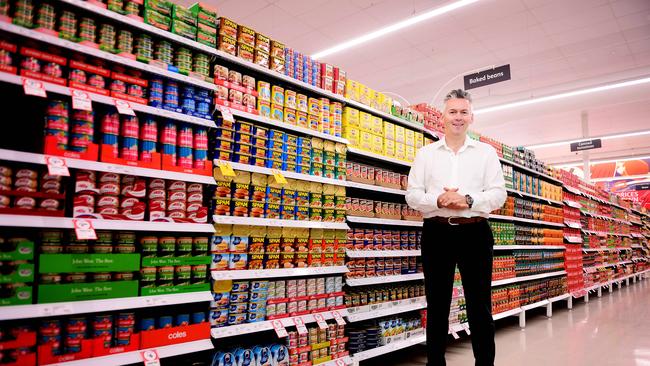Coles boss John Durkan puts paid to talk of supermarket price war truce
Coles boss John Durkan has put an end to any hope of a halt to hostilities in the long-running supermarket price wars.

Coles boss John Durkan has snuffed out any hope the supermarket price wars of the last 10 years are about to end, arguing he expected grocery prices to fall around 1 per cent a year for the foreseeable future despite retailer margins being squeezed by higher power and wage costs.
Mr Durkan added that new entrants into the $90 billion grocery sector such as German discounters Kaufland and Aldi, and Amazon, would inject new urgency into maintaining lower and competitive shelf prices which Coles would meet.
This was especially the case as the three new offshore retail businesses were not “high-end retailers” that had made their name by putting prices up, but were putting prices down.
“We have been cutting prices for eight years now, and that ain’t changing,’’ Mr Durkan told The Australian this afternoon.
“We are still lowering prices and in fact since Christmas we have lowered a whole raft of key brands. And we are going to continue to do that.
“This isn’t going away.’’
Mr Durkan said since Christmas Coles had reduced the prices of more than 500 products.
Coles bass was responding to comments from Fred Harrison, the chief executive of the nation’s biggest independent supermarket chain Ritchies, in The Australian today, where he welcomed some inflation back into the grocery sector after years of prices being slashed by Woolworths and Coles which he labelled as “ridiculous’’.
He argued for a return to an “equilibrium” under which the retailers could cover their bills and make a reasonable return on their investment.
“The Australian consumer has had it so good for a number of years,” he told The Australian. “Consumers have been the big winners and now there has to be a little bit of equilibrium in the market to get a fair return for retailers’’.
Mr Harrison found some comfort in the fact that last week Coles said it would rest its ‘Down Down’ TV ads, or at the very least give them a back seat, as it focused a campaign on issues other than price that would attract shoppers to Coles. Mr Harrison believed ‘Down Down’ was coming to an end.
“Down Down isn’t going away,’’ Mr Durkan said, “I have to dispel that one straight away, oh my God, no way, we are going to keep on lowering prices for customers — it is a part of our DNA now.’’
Mr Durkan said grocery prices would continue to trend downwards, especially as new retailers arrived in Australia.
“The competition that is coming in isn’t going to put prices up. It is not just Kaufland, it’s Kaufland, Aldi and Amazon, all three of them are not sitting around putting prices up, that ain’t going to happen.
“They are not high-end retailers who put prices up, they put prices down.
“So we have got to be price competitive and we have said that all along.’’
Mr Durkan noted that for the last eight years deflation had been running at about 1 per cent.
“That is the rate I see it at, 1 per cent a year, in our business for sure.’’
It comes as Credit Suisse has issued a report to its clients today arguing that the market might have got too pessimistic on Coles with the structural differences between it and market leader Woolworths only marginal.
Added to this is a view from the analyst, Grant Saligari, that Bunnings in Australia and New Zealand will continue to outperform and that the underperformance of Bunnings in the UK and Ireland will be dealt with within the next six months.
Credit Suisse has therefore upgraded its target price for Wesfarmers (WES), the Perth-based conglomerate that owns Coles and Bunnings as well as Officeworks, Kmart and Target, to $44.98 per share (previously $40.65 per share) and lifted its rating to ‘outperform’ from ‘neutral’.
“This is a relative value call based on an upgrade to our valuation of Bunnings Australia New Zealand (BANZ), the likelihood that the underperformance of Bunnings UK and Ireland (BUKI) will be dealt with within the next six months (either through a decision to close or demonstrated path to profitability) and implied undervaluation of Coles,’’ Mr Saligari said in his note to clients.
Mt Saligari in particular believes the market might have swung too negative on Coles, with an implied value of 9-11x EBIT, compared with Woolworths at 14x expected 2018 EBIT.
“On the face of it, Coles does not appear to be over-indexing on sales or profit relative to Woolworths and structural differences between the businesses are at the edges. Our price surveys show no material difference in price levels or promotional behaviour between Coles and Woolworths.
“That is plenty of opportunity, even in an environment in which revenue growth is expected to remain low across the industry.”
Investors have grown pessimistic over Coles in the last few years as Woolworths mounts a fightback and pours billions of dollars of funds into lowering its prices to be more competitive. This has generated stronger like-for-like sales growth for Woolworths which has turned the tables on Coles and delivered higher same-store sales growth for the last five quarters. Before that, Coles had beaten Woolworths for eight years.
“With Coles’ performance deteriorating on financial and non-financial metrics in 2017, whether the 2017-18 experience is simply an inevitable convergence in relative performance or likely to play out in a prolonged trend is clearly central to our value argument,’’ Mr Saligari said.
“We back the convergence conclusion and largely think the future is still in Wesfarmers and Coles’ hands and there is a realistic potential to stabilise performance without a more severe profit reset and underperformance.







To join the conversation, please log in. Don't have an account? Register
Join the conversation, you are commenting as Logout